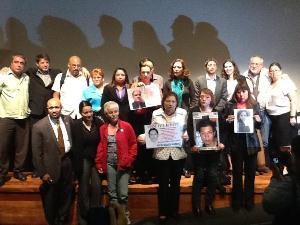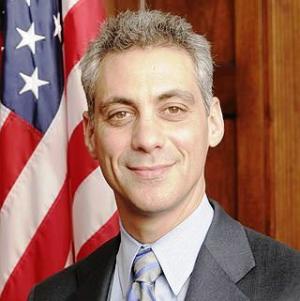Two Oregon marijuana legalization initiatives are in a mad scramble to make the ballot after being hit with unprecedented high invalidation rates for signatures already handed in. And they only have two weeks to go.
A Caravan of Peace calling for an end to failed prohibitionist drug policies in the US and Mexico will leave San Diego in August and arrive in Washington, DC, in September. It's hoping to educate some people along the way and have a lasting impact.
The Senate has included federal funding for needle exchanges in its Health & Human Services FY 2013 appropriations bill. The House is expected to approve a bill without it, setting up a fight in conference committee down the road.
DrugWarFacts.org, a publication of Common Sense for Drug Policy, is an in-depth compilation of key facts, stats and quotes on the full range of drug policy issues, excerpted from expert publications on the subjects. The Chronicle is running a series of info items from DrugWarFacts.org over the next several weeks, and we encourage you to check it out.
Gov. Lincoln Chafee (I) signed marijuana decriminalization into law Tuesday. It goes into effect April 1, 2013.
A bill that would have ended the NYPD's abuse of New York's marijuana decriminalization law has been stymied by Senate Republicans.
A new poll has the Washington state pot legalization initiative leading with 50% support, but that doesn't leave a lot of room for a margin of comfort.
It's mainly news from California this week, with DEA and LAPD raids leading the way, but also some snippets from Colorado and Montana, and the DEA head goes on the hot seat.
Chicago looks set to pass a marijuana decriminalization ordinance later this month after Mayor Rahm Emanuel endorsed the effort.
Japan is moving to designate some synthetic cannabinoids and synthetic stimulants as "narcotics," effectively banning them.
Just another run of the mill week of drug war law enforcement corruption, except having a state trooper involved in a major pot grow is fairly unusual.
Events and quotes of note from this week's drug policy events of years past.
In Oregon, two separate marijuana regulation and legalization initiatives that appeared poised to make the ballot a month ago are now on pins and needles after having unprecedented numbers of voter signatures invalidated by state election officials. With just two weeks to go before the July 6 deadline to hand in signatures, both campaigns need to come up with tens of thousands of signatures in a hurry.

Mt. Hood, northern Oregon
The two measures are the
Oregon Cannabis Tax Act (OCTA) initiative, which would allow for the legal cultivation and sale of marijuana, and the
Oregon Marijuana Policy Initiative (OMPI) constitutional amendment, which would give
Oregonians the constitutional right to possess marijuana.
OCTA needs 87,213 valid signatures to make the ballot, while the
OMPI needs 116,284, having a higher threshold because it is a constitutional amendment.
At the end of May, both campaigns turned in enough signatures to qualify for early verification by the secretary of state's office. They achieved that goal by turning in enough raw signatures to meet their respective targets -- and then some.
OCTA turned in 108,000 signatures and
OMPI turned in 122,000, putting them well within range of qualifying if they got the typical invalidation rate of 30% to 35%.
But this week, election officials announced a real shocker. According to the
Secretary of State's office, not only did neither initiative have enough valid signatures to qualify for the ballot, but both were seeing signatures invalidating at record high levels.
OCTA qualified only 55,869 signatures and
OMPI qualified only 63,804. That means
OCTA needs another 32,000 valid signatures and
OMPI needs another 53,000.
Based on the raw numbers, both initiatives had signature approval rates of around 50%, although the official figure is slightly higher because election officials threw some signatures out at the beginning. For
OCTA the official rate was 58.5%, and for
OMPI the official rate was 54.1%.
Still, "things are looking pretty good" despite the sucker punch from election officials, said
OCTA chief proponent Paul Stanford. "We've collected another 40,000 signatures since the early deadline and now have 140,000."
OCTA is getting a boost from the United Food and Commercial Workers (
UFCW) Local 555, which represents 19,000 workers in Oregon and southwest Washington. The union has endorsed
OCTA and is putting some muscle behind the effort.
"From retail to manufacturing to health care, we recognize that a vibrant hemp and cannabis industry in Oregon will create thousands of family-wage, sustainable jobs across the entire state," said union President Dan Clay.
"They're helping us out," said Stanford. "They have access to the state Democratic Party voter access network, and we were able to use that to do a huge mailing to 12,000 activists. We decided to target the people identified as the most progressive and who had not missed a vote in the last six years. And then we
robocalled them -- we only mailed to people we had telephone numbers for. We got 9,355 people who said they would sign, and we think that can turn into an additional 10,000 to 25,000 signatures."
OCTA is also tightening its procedures, Stanford said. "We're screening our signatures much better now, we're checking in with every single petitioner. We're closely scrutinizing every incoming sheet," he said.
The path to the ballot is a bit steeper for
OMPI, but the campaign said it would carry on.
"Because of the historically low and unusually low validity rate as determined by the Oregon Secretary of State's office, getting on the ballot is going to present an even larger challenge in the last three weeks, but we will continue to gather signatures and will challenge the decisions invalidating signatures," said Robert Wolfe, one of the three proponents behind the
OMPI. "Mathematically, we can still do this despite the unusually low validation rate."
But while Wolfe maintained the
OMPI could still gather enough new signatures to qualify for the ballot, most of his energy seemed focused on challenging the invalidated signatures.
"First, we have to recover copies of every sheet they've worked on to see which signatures were invalidated and why and then to double check their work," he said. "We have other options, up to and including filing for injunctive relief in circuit court."
The lowest validity rates recorded in Oregon initiatives have been 65%, and Wolfe said the
OMPI had programmed its signature drive to get enough valid signatures even if the validity rate reached that historic low.
"To come in at 54% was a real shock," he said.
Oregon initiative campaigners are facing a tougher stance from election officials, for reasons that don't necessarily have much to do with marijuana. Plagued by repeated anti-tax initiatives filed by arch-conservatives in the past two decades, progressive state officials have continually tightened signature-gathering and -validation requirements as a means to fend them off. But those measures are making it harder for everybody.
"Over the past few years, the Secretary of State's office has enacted rules and procedures that seek to exclude every possible signature from being counted. That disenfranchises a lot of voters," Wolfe said. "I think those are progressive officials, and progressives should seek to include every possible signature, to honor the intent of voters who signed. I don't think they're acting in the interest of democracy."
"There have been a lot of changes and increasing restrictions on way the petitioning works," concurred Stanford. "We had 9,000 signatures invalidated because the petitioner's badges had not been certified."
Stanford said the
OCTA would make a final push over the 4
th of July holiday. "We have 140,000 signatures now and we think we need 160,000, but we think we'll have 170,000 by the deadline," he said.
Marijuana legalization initiatives are already on the ballot in Colorado and Washington. Will Oregon make three? In two weeks, we'll see.
back to top
Aghast and appalled at the bloody results of Mexican President Felipe Calderon's war on drugs, which has resulted in at least 50,000 deaths since he deployed the military against the so-called drug cartels in December 2006 and possibly as many as 70,000, dozens of organizations in Mexico and the US announced Monday that they will take part in a "Caravan for Peace" that will journey across the US late this summer in a bid to change failed drug war policies on both sides of the border.

caravan launch at Museo Memoria y Tolerancia, Plaza Juárez, Mexico City (@CaravanaUSA @MxLaPazMx)
Led by Mexican poet Javier
Sicilia, who was spurred to action by the murder of his son by cartel members in
Cuernavaca in 2010, and the
Movement for Peace with Justice and Dignity (MPJD) he heads, the caravan will depart from San Diego on August 12 and arrive in Washington on September 10 after traveling some 6,000 miles to bring to the American people and their elected officials the bi-national message that failed, murderous drug war policies must end.
The caravan will be underway in between presidential elections in the two countries. Mexico will choose a successor to Calderon on July 1, and whoever that successor is, will be re-tooling its fight against the drug cartels. By late summer, the US presidential campaign will be in full swing, and advocates hope to have at least some impact on that as well.
The caravan builds on similar efforts last year in Mexico. Led by
Sicilia and other relatives of drug war victims, one caravan of more than 500 people left
Cuernavaca and traveled north through 15 cities to
Ciudad Juarez, one of the epicenters of prohibition-related violence in Mexico. A second caravan left Mexico City with 700 people traveling south through 21 cities. Those caravans helped turn what was an amorphous fear and dismay among Mexicans at the violence into a political movement that has put the issue of the drug wars and their victims squarely on the Mexican political agenda.
"The war on drugs has had painful consequences for our country, such as corruption and impunity," said
Sicilia at a Mexico City press conference. "The proof of this is that Mexico has seen over 70,000 deaths and 10,000 disappearances, and this is closely linked to US regional security policies, which have sparked widespread areas of violence, human rights violations, and the loss of the rule of law. The drug war has failed," he said bluntly.
"On August 12, Mexicans will come to the US and cover a route of 25 cities in one month,"
Sicilia continued. "Our message is one of peace, and our journey will be peaceful with an open heart and the hope of speaking with each other. We believe the harm we live is linked to the failed policies we want to change."
"Regarding policies on the war on drugs, we propose the need to find a solution with a multidimensional and international approach that places the dignity of the individual at the center of drug policy,"
Sicilia said. "We call on both Mexican and US civil society to open and maintain a
dialogue on evidence-based alternatives to prohibition and to consider various options for regulating drugs."

Javier Sicilia on CNNMéxico
For
Sicilia and the caravan, drug policy is inextricably tied to other policies and issues that affect both sides of the border. The caravan is also calling for a ban on the importation of assault weapons to the US (because they then end up being exported to Mexican criminals), a higher priority for concentrating on money laundering, an end to US immigration policies that have resulted in the
militarization of the border and the
criminalization of immigrants, and a refocusing of US foreign policy to emphasize human rights while suspending US military aid to Mexico.
The broad range of interrelated issues is helping build a broad coalition around the caravan. Groups concerned with the border, immigrant rights, human rights, racial justice, and labor are all coming on board.
"Forty years ago, then President Nixon inaugurated the war on drugs, and we've not won the war on drugs -- the only thing we've achieved is being the world's leader in incarceration," said Dr.
Niaz Kasravi, with the
NAACP criminal justice program. "Through these policies, we've also promoted violence and death for those caught up in the drug war in the US and Mexico. In the US, those who have borne the brunt of it have been people of color. The war on drugs hasn't made our communities safer, healthier, or more stable, but has resulted in the mass incarceration of people of color, a
de facto Jim Crow. We are in a violent state of emergency that must end, and we stand committed to ending the war on drugs."
"We emphasize the dignity and humanity of immigrants in the US," said Oscar
Chacon of the
National Alliance of Latin American and Caribbean Communities (
NALACC), "and when we were invited to consider joining the caravan, we identified with it as a cause of our own. We see our issues reflected throughout the caravan. Policies that emphasize
militarization and authoritarianism and enforcement and punishment have human rights violations as their natural results. We see in the caravan an opportunity to write a new chapter in our initiatives to highlight the value of respect for all human life and we will use our participation to further educate Latino and immigrant communities about the relationship between policy decisions made in Washington and the sad effects they can have -- in this case, particularly for our Mexican brothers and sisters."
"Prior to coming here, I did not know the extent of the pain, sorrow, and suffering of the families here in Mexico," said Neill Franklin, head of
Law Enforcement Against Prohibition. "There are so many orphans, so many families being attacked. Families and future generations are also under attack in my country, with drive-by shootings and running gun battles in the streets of our big cities. Most of those targeted by the drug war here are blacks and Latinos; we have many broken families and communities because of these policies. This caravan will unite our people, our pain, and our solutions in an effort to save our sons and daughters."
"This is a historic moment and one of great necessity," said Ted Lewis of
Global Exchange. "The caravan arrives between two presidential elections, and that's intentional, not because we have electoral ends, but because we want the message to be heard on both sides of the border. This is a truly
binational effort, and it is very important that leaders on both sides of the border take this message deeply into account as they organize in Mexico a new administration and as they campaign here in the US. This issue must be dealt with now."
Also on board is
Border Angels, a San Diego-based group best known for leaving caches of water in the desert to help save the lives of undocumented immigrants heading north. The group has long been critical of increased border enforcement efforts such as Operation Gatekeeper, which have pushed those immigrants away from urban areas and into harsh and unforgiving environments as they seek to make their way to a better life.
"Operation Gatekeeper has led to more than 10,000 deaths since 1994," said the group's Enrique
Morones. "Two people die crossing the border every day, but they are also dying south of the border. Now, we see a new wave of migration to escape the terrible violence in Mexico, the country of my parents, and that's why we are joining this movement for peace in this historic caravan. We have told both Obama and Calderon that human rights, love, and peace have no borders. We demand peace, justice, and dignity."
"I think this will really have a significant impact," said Ethan
Nadelmann, executive director of the
Drug Policy Alliance. "It's going to be a pivotal moment, just a month after the Mexican elections and just a few months before the US elections. I don't think drugs will be a major issue, but it will be bubbling up from time to time."
The caravan will seek to raise awareness on both sides of the border,
Nadelmann said.
"Americans need to be aware of the devastation in Mexico from the combination of US demand and our failed prohibitionist policies," he said. "It's also important that Mexicans understand the devastating consequences of the war on drugs in the US -- the arrests and incarceration, the evisceration of civil rights. This mutual understanding is a pivotal part of what we're trying to accomplish."
"I hope the message will come through that change is needed on both sides of the border,"
Nadelmann continued. "We've seen the failures of prohibition on both sides, but the biggest impetus has to come from the US through legal regulation of marijuana and more innovative policies to reduce demand -- not from locking up more people, but by providing effective drug treatment and allowing people addicted to drugs to get them from legal sources. We need a
fundmentally different approach, and this caravan will be a leap forward in understanding the consequences of failed prohibition."
back to top
The Harm Reduction Coalition has reported that language authorizing the use of federal funds for needle exchange programs has been included in the Senate's Fiscal Year 2013 Labor, Health & Human Services appropriations bill. Funding had been approved for FY 2010 and 2011, but the formerly longstanding ban on federal funding was reinstated in December for FY 2012.
The Republican-controlled House of Representatives is expected to once again vote for the ban on needle exchange funding in its version of the appropriations bill. Having funding language in the Senate version will give Senate negotiators something to negotiate on needle exchange when the bills are reconciled, which probably won't happen until after the November elections.
The language approved by the Senate is compromise language that only bans federal funding "in any location that has been determined by the local public health or local law enforcement authorities to be inappropriate for such distribution." The Harm Reduction Coalition calls that language "consistent with what we advocated for" and notes that the same language allowed needle exchanges in 10 jurisdictions and multiple
SAMSHA-funded programs to use federal funds.
The Senate appropriations bill also includes some other good harm reduction news. In its non-binding report, it calls for an overdose prevention public awareness campaign. That report does not specifically mention the anti-overdose drug
naloxone, which the Coalition had sought, and the Coalition said it would continue to lobby on that issue.
And, like last year, the bill includes $10 million for viral hepatitis screening. The funding announcement for those dollars from last year's bill has now been released and includes $1.6 million for hepatitis C testing and referrals to programs reaching out to injection drug users, including needle exchanges.
The report accompanying the FY 2013 bill also "notes the high incidence of hepatitis among injection drug users and urges
SAMHSA to implement viral hepatitis testing as a standard of care in drug-treatment programs, consistent with the
HHS Action Plan for the Prevention, Care and Treatment of Viral Hepatitis."
back to top
Different kinds of drugs affect people differently, but the details often get lost in debate. Read about the specific kinds of impact that different classes of drugs can have on people, including for driving and other safety-sensitive activities, in the Drug Testing -- Impairment section of DrugWarFacts.org.
DrugWarFacts.org, a publication of Common Sense for Drug Policy (CSDP), is an in-depth compilation of key facts, stats and quotes on the full range of drug policy issues, excerpted from expert publications on the subjects. The Chronicle is running a series of info items from DrugWarFacts.org over the next several weeks, and we encourage you to check it out.
Follow Drug War Chronicle for more important facts from DrugWarFacts.org over the next several weeks, or sign up for the DWF new facts RSS feed.
Read last week's Chronicle DrugWarFacts.org blurb here.
Common Sense for Drug Policy is a nonprofit 501(c)(3) organization dedicated to reforming drug policy and expanding harm reduction. CSDP disseminates factual information and comments on existing laws, policies and practices.

back to top
Rhode Island Gov. Lincoln Chafee (I) last Tuesday signed into law a decriminalization bill passed by the state legislature. Rhode Island now becomes the 15th state to have decriminalized the possession of small amounts of marijuana.

Rhode Island State House, Providence (wikimedia.org)
Rhode Island now joins its its northeastern neighbors Connecticut, Maine, Massachusetts, New York, and Pennsylvania is choosing to remove criminal penalties for possession of small amounts of pot. Nationwide,
14 other states have decriminalized, the first wave in the
1970s and the second beginning with Nevada in 2001 and picking up momentum in recent years.
The measure,
Senate Bill 2253, makes the possession of up to an ounce of marijuana a civil offense punishable by a fine of $150 for most offenses. Under current Rhode Island law, pot possession is a misdemeanor punishable by up to a year in jail and a $500 fine.
"
Gov.
Chafee's signature is the culmination of a years long effort to put some common sense back in our marijuana laws," said Sen. Josh Miller (D-Cranston), lead Senate sponsor. "Rhode Island will now address marijuana use among our youths with education and treatment, as opposed to incarceration, increasing our chances of stemming the abuse of drugs and alcohol."
"This change means that a youthful indiscretion will no longer prevent a responsible adult from finding gainful employment," said Rep. John Edwards (D-Portsmouth,
Tiverton), lead sponsor in the House. "A dumb mistake can no longer be used as grounds for withholding federal student aid or jeopardizing future employment. Everyone in Rhode Island benefits from this change in law."
"
Gov.
Chafee’s approval is yet another concrete example of the mainstream support for sensible marijuana policy reform. Two-thirds of the Rhode Island public supports this proposal, as does more than two-thirds of the Rhode Island General Assembly. Support for marijuana policy reform is real and growing every day. I commend
Gov.
Chafee and his team for supporting policy that is both popular and reasonable," said Robert
Capecchi, legislative analyst with the
Marijuana Policy Project (
MPP).
MPP led the lobbying and grassroots effort in support of the legislation.
The law will go into effect April 1, 2013.
back to top
New York decriminalized the possession of small amounts of marijuana in 1977, but New York City police continue to arrest 50,000 people a year for pot possession after stopping-and-frisking them, then tricking them into emptying their pockets and revealing their baggies of weed, triggering the misdemeanor offense of public possession of marijuana.

March 2012 protest of NYC stop and frisk violations
In a bid to end that practice,
Gov. Andrew Cuomo (D) and the Democratically-controlled Assembly moved to reform the decriminalization law by removing the public possession provision with
Assembly Bill 10581, but Monday night, Republicans and their Conservative Party allies in the Senate effectively killed it.
The Senate Republicans caved under pressure from Conservative leader Mike Long, who threatened to not allow any Republicans who supported the bill to appear on the Conservative Party line. The Senate then refused to take up the bill. That means the mass arrests, predominantly of young people of color, for what should, under state law, be only a
ticketable offense, will continue, costing the state tens of millions of dollars each year.
The Republican failure to act comes in the face of widespread law enforcement support for the reform, including NYPD Commissioner Raymond Kelly, the district attorneys in all five New York City boroughs and suburban Nassau County, and even the New York City Patrolman's Benevolent Association. Kelly called the reform "a balanced approach," while Manhattan DA Cyrus Vance said it would bring greater "safety and fairness" to the criminal justice system and it was "the right thing to do."
"The Senate Republicans have single-handedly decided to continue ruining tens of thousands of lives -- mostly those of young people of color -- every year. Opposing law enforcement and the clear political consensus in the state is not just heartless -- it's a political miscalculation that will come to haunt them," said Dr. Divine Pryor, executive director of the
Center for NuLeadership on Urban Solutions.
"Even Mayor Bloomberg and Commissioner Kelly have come out in support of this legislation. So what's holding up the Senate from passing smart reforms that will eliminate the tens of thousands of unlawful arrests taking place in the city every year?" said Alfredo
Carrasquillo, community organizer with
VOCAL New York.
Last week, the New York City Council passed a resolution by an overwhelming margin calling for an end to racially biased, costly, unlawful arrests. The resolution, introduced by Council Members Melissa
Mark-Viverito and Oliver
Koppell, was cosponsored by a majority of council members. The resolution came a day after hundreds of
community activists went to Albany to deliver thousands of signatures to demand the New York State Senate pass legislation to decriminalize marijuana possession in public view.
"The New York Senate Republicans are doing what Republicans do best at the federal and local level -- they are obstructing progress and paralyzing government. The Republican Conference in the State Senate is completely out of touch with our communities of color in New York City and because of their inaction, tens of thousands more of our young people of color will be arrested before the end of this year, saddling them with a criminal record," said
Mark-Viverito. "The governor, our mayor, the police commissioner, the city council, five district attorneys and criminal justice advocates are all on the same page here. Marijuana was decriminalized in 1977; all we are trying to do is close the 'in public view' loophole that is allowing thousands of unjust arrests of black and Latino youth in our communities."
"It wasn't too long ago that we referred to the 'three men in a room' when discussing the leadership structure in Albany. Now when we talk about leadership in the Senate, we should talk about 'one guy in Brooklyn,' said Gabriel
Sayegh, New York state director of the
Drug Policy Alliance. "While we are disappointed by the lack of action, we're not going anywhere. This campaign for reform has already scored a major victory by bringing this issue to the attention of New Yorkers and the entire country. We cannot and will not accept a situation where the laws are applied differently to different people based on their race or ethnicity or where they live. We'll keep pushing for reform, for fairness, equality, and justice. Given the overwhelming support by law enforcement for this proposal, I think Majority Leader
Skelos and even Mr. Long will come to do what’s right."
back to top
An initiative to regulate and legalize marijuana in Washington state was leading by 13 points in a Public Policy Polling survey released Tuesday. The poll had support for the initiative, I-502, at 50%, with 37% opposed and 13% undecided.

Seattle skyline
The poll is good, but not great, news for
New Approach Washington, the high-powered group behind the initiative campaign. It shows support two points higher than
a similar poll in January, but not high enough for the campaign to have much of a comfort zone.
The conventional wisdom among initiative watchers is that initiatives should be polling at 60% or above going in because opposition during the campaign season is bound to shave some points away by election day. That means that while New Approach Washington can take succor in the lead it holds, it still has its work cut out for it to cross the finish line victorious.
Looking at the
cross tabs, support for legalization was higher among men (55%) than women (46%) and all age groups except the over-65 had support higher than 50%. Somewhat surprisingly, support was highest among those aged 46 to 65 (55%), followed by those aged 30 to 45 (54%) and those aged 18 to 29 (52%).
A large partisan divide has also emerged, with legalization supported by a whopping 70% of Democrats, but only 22% of Republicans. Independents came in at 54% in support. And although Washington's minority population is small, non-whites are supporting legalization at a higher rate (60%) than whites (49%).
Public Policy Polling surveyed 1,073 Washington voters from through automated telephone interviews from June 14 to June 17. The margin of error for the survey is +/-3.0%. This poll was not paid for or authorized by any campaign or political organization.
back to top
It's mainly news from California this week, with DEA and LAPD raids leading the way, but also snippets from Colorado and Montana, and the DEA head on the hot seat. Let's get to it:
National
On Wednesday,
DEA administrator Michelle Leonhardt ran into tough questioning (go to 47:15) at a House Judiciary Committee hearing on DEA oversight. After Rep. Jared
Polis (D-CO) repeatedly and fruitlessly asked her whether meth or heroin is worse than marijuana, the best she could come up with was "all illegal drugs are bad." Nor would she concede under repeated questioning from Rep. Steven Cohen (D-TN) that marijuana causes less harm than meth. Cohen also went after
Leonhardt on medical marijuana.
"Have you ever seen a person who had cancer and used marijuana to alleviate their condition?" Cohen asked. "I have, and would you agree it has some benefit for somebody who is dying, that marijuana is the only thing that makes him eat and smile according to his 80-year-old mother?"
"That's between him and his doctor,"
Leonhardt replied.
"Then why does the DEA take the position that medical marijuana is wrong?" Cohen asked before
Leonhardt got a reprieve because his time was up.
California
Last Thursday,
the DEA raided the G3 Holistic dispensary in Upland and federal prosecutors issued indictments for six people in connection with the raid.The folks behind
G3 had operated three dispensaries, but shut down two after being warned to close by the feds eight months ago. Three operators of the chain as well as three workers involved in an Ontario grow warehouse that supplied it were taken into custody. All are charged with conspiracy to manufacture marijuana, possession of pot with intent to distribute it, and maintaining a drug location. They all face up to life in prison if convicted. The defendants were due in court in Riverside today.
As of last Thursday,
there are no more dispensaries in Whittier. Whittier Hope Collective shut its doors after receiving a threat letter from federal prosecutors June 5. The Whittier City Council on a 3-2 vote in October 2009 approved a conditional-use permit allowing Whittier Hope Collective to operate. Nearly a year later the dispensary opened. The collective even joined the Whittier Area Chamber of Commerce. Now, its 5,000 members will have to go elsewhere.
Last Tuesday,
Lake County supervisors directed county staff to draft an interim urgency ordinance restricting medical marijuana cultivation in unincorporated areas of the county. Staff will take under consideration comments from the Board of Supervisors, the public, and the Lake County Medical Marijuana Cultivation Ordinance Advisory Board. The supervisors are expected to consider the draft ordinance next week.
Last Friday,
the IRS announced it had seized the bank accounts of a Sacramento dispensary. The DEA had raided the El Camino Wellness Center earlier in the week. The IRS said it seized $870,000 from bank accounts in what it described as a money-laundering investigation. The seizures underscore efforts by federal authorities to crack down on dispensaries by employing laws traditionally used to target money transfers by narcotics traffickers. The IRS referred to the dispensary as an "illegal marijuana store." El Camino opened in 2008 and last year became the first Sacramento dispensary issued a permit under a city regulatory program for medical marijuana outlets. The city is still collecting voter-approved taxes on local dispensaries, amounting to $1.1 million between July 2011 and March of this year.
Also last Friday,
a Shasta County medical marijuana collective threatened to sue the county over its ban on dispensaries. The Medicine Man Collective Spiritual Center Corporation filed a claim earlier in the week saying the ban will have robbed them of $17.2 million by 2013. It is demanding a meeting with county officials to revise the rules, and says it will seek that amount in court if the county doesn't comply. The collective claims it had served some 20,000 patients in the past. County supervisors passed an ordinance banning pot collectives indefinitely in the unincorporated part of the county in December, and they also passed the county's first-ever ordinance limiting growing. The county counsel has 45 days from the date the claim was filed to accept or reject it.
On Monday,
a San Diego initiative to regulate dispensaries failed to make the ballot. Citizens for Patient Rights and the Patient Care Association needed to gather 62,000 valid signatures to qualify, but collected fewer than 20,000. Proponents said the federal crackdown and prosecutions by San Diego DA Bonnie
Dumanis had depleted dispensary ranks and impeded the flow of money needed to raise the signatures. The same groups last year collected more than 40,000 signatures to successfully repeal a city ordinance that medical marijuana dispensary directors and patients believed was too restrictive. They plan to pursue another initiative or to work with the new city council and mayor to pass regulations after the fall election.
Also on Monday,
activists in Del Mar asked the city council to adopt a dispensary ordinance after collecting signatures from well over 10% of Del Mar voters. The Patient Care Association led the signature drive and hopes the council will immediately pass the Compassionate Use Dispensary Regulation and Taxation Ordinance in order to serve medical pot patients in Del Mar sooner rather than possibly later. But Del Mar officials opted to instead receive a report on the measure. By doing so, the council will have the choice to either adopt the ordinance within 10 days of receiving the report, to be issued by mid-July, or order an election. The Patient Care Association expects to qualify ballot measures in
Solana Beach and Lemon Grove by the end of the week and in Encinitas by the end of the month. The proposed compassionate use dispensary ordinance would impose a 2.5 percent sales tax on medical pot to benefit the city's general fund.
Also on Monday,
the Oaksterdam Cannabis and Hemp Museum announced plans to relocate. The museum, which is affiliated with
Oaksterdam University, is being forced out of its present location by the April DEA and IRS raids on
Oaksterdam properties, and must relocate by the end of the month. The relocation is a result of concerns raised by the City of Oakland about having the publicly accessible museum in a shared space with a downtown Oakland medical cannabis dispensary. The museum has been closed since the raids.
Also on Monday,
the San Francisco City Attorney filed a brief defending the rights of local governments in California to issue permits authorizing medical cannabis collectives to serve their patients, urging the state Supreme Court to reverse a Court of Appeal holding that such regulation is substantially preempted by federal law. The
amicus brief authored by Dennis Herrera and joined by Santa Cruz County Counsel Dana
McRae argues that discretionary permitting, an integral element in planning and land use policy, is particularly essential for local regulation of medical marijuana dispensaries. The appellate court's October 4, 2011 ruling in
Pack v. Long Beach, Herrera and
McRae contend, wrongly hinders the ability of local governments to protect public health and safety effectively, and to enact policy innovations tailored to local needs.
Also on Monday,
the San Leandro City Council again punted on regulating dispensaries and grows. The council agreed to take up the issue again next month. A moratorium is in effect until September 30, but city staff has warned the council it should have an ordinance in place before then. The council has been hesitating, waiting to see what happens with a dispensary regulation bill in Sacramento.
On Tuesday,
Tulare County supervisors voted to oppose a statewide dispensary regulation bill over fears the regulations could limit local control of marijuana dispensaries and grow sites. The bill, Assembly Bill 2312, sponsored by Tom
Ammiano (D-San Francisco), would require commercial marijuana growers to register with a new Board of Medical Marijuana Enforcement, and counties and cities could tax marijuana if local voters agree. It passed the Assembly last month, and is set for a Senate committee hearing next week.
Also on Tuesday,
the LAPD raided two dispensaries in Woodland Hills because of "illegal sales" of marijuana. Witnesses identified the dispensaries as Green Joy and Green Magic, both on Ventura Boulevard. The raids were carried out by the
Topanga Narcotics Division. The LAPD has been busy in the San Fernando Valley, with the department claiming that it had wiped out all cannabis stores in its Devonshire Division.
Also on Tuesday,
Long Beach police raided a downtown dispensary just hours before the city council was to hear a report on enforcement of its four-month-old dispensary ban. Hit was THC Downtown, which had applied for a permit through a lottery process (while the city still handed out permits), failed to win the lottery, but opened anyway. Police said three employees and two security guards would face misdemeanor charges of violating the city's ban on dispensaries that were not permitted.
On Wednesday,
patients and activists rallied in Sacramento to protest last week's raid on the El Camino Wellness Center. "The Obama administration is betraying patients and lying to the public," said Kris Hermes, spokesperson with Americans for Safe Access (
ASA), one of the groups organizing Wednesday's protest. "The president and the attorney general have said publicly that the Justice Department is not targeting state-compliant medical marijuana dispensaries, but that's exactly what it's doing." Earlier this month, Attorney General Eric Holder told members of the House Judiciary committee that, "We limit our enforcement efforts to those individuals, organizations that are acting out of conformity with state law." However, by all accounts, El Camino was acting in full conformity with local and state laws.
Colorado
On Monday,
the Commerce City City Council approved regulations under which medical marijuana businesses must apply for a conditional permit, and then for a business license. The program goes into effect July 1. License applicants must sign waivers that release the city from any liability for injuries or damages if state or federal agencies seek arrest or prosecution. The ordinance creates rules for regulating dispensaries, cultivation facilities, production and manufacturing of medical marijuana products.
Montana
Earlier this month,
state Democrats added support for medical marijuana to their party platform. The new plank says that, because voters approved the use of medical marijuana, the Democratic Party supports "the right of qualified patients with a medical condition where marijuana is appropriate (to) have safe access to medical marijuana." Party spokesmen said the measure didn't spark much debate at the party convention. Some 61% of voters approved the Montana Medical Marijuana Act in 2004, but a combination of federal raids and changes by the Republican-led state legislature have left the program in tatters.
back to top
Chicago Mayor Rahm Emanuel (D) said last Friday he backed a city council proposal to decriminalize the possession of small amounts of marijuana. The council is set to vote later this month on an ordinance that would decriminalize the possession of up to 15 grams of pot.

Chicago Mayor Rahm Emanuel (D)
Fifteen states, including Rhode Island, whose governor signed a decriminalization bill into law Tuesday, have decriminalized the possession of small amounts of marijuana, as have several large American cities.
Chicago police arrested more than 18,000 people on small-time (less than 10 grams) marijuana possession charges last year. Each arrest involves about four officers -- two to arrest and two to transport -- said a statement from the mayor's office.
"These arrests tied up more than 45,000 police hours," Police Superintendent Garry McCarthy said in the statement. "The new ordinance nearly cuts that time in half, which equals an approximate $1 million in savings, while freeing up cops to address more serious crime."
Under existing law, people caught with small amounts of marijuana face up to six months in jail. If the ordinance is approved, they would face only a citation and the loss of their weed.
Emanuel had originally been lukewarm on decriminalization, saying when the topic was broached last year only that he would ask the police to do an analysis. Now, that analysis is in, and Emanuel is on board.
"The result is an ordinance that allows us to observe the law, while reducing the processing time for minor possession of marijuana -- ultimately freeing up police officers for the street," Emanuel said.
The move on decriminalization comes as Chicago faces a long, hot summer. There have been 185 homicides through May 13, up from 116 during the same period last year. And the violence has continued since then, with 22 more people killed this month. Freeing up police resources by decriminalization could be seen as helping to address the violence problem.
The ordinance will likely go for a vote before the City Council on June 27.
back to top
The Japanese government will ban four new synthetic drugs in August, according to Japanese press reports. The four drugs are the synthetic cannabinoids JWH-018 and cannabicyclohexanol and the synthetic stimulants mephedrone and MDPV.

mephedrone among new synthetic drugs to be banned in Japan
The synthetic
cannabinoids are commonly sold as incense and marketed in the US under brand names like Spice and K2. The synthetic stimulants are commonly sold as plant fertilizer and marketed under names such as Ivory Wave. The two types of synthetic drugs are commonly referred to as "fake pot" and "bath salts," respectively.
The compounds have been banned in the European Union, and numerous states in the US have also taken action to prohibit them. Legislation is pending in the US Congress to ban them as well, and both sets of drugs are currently banned federally under emergency DEA edicts.
The Japanese Health, Labor and Welfare Ministry will designate the four synthetic drugs as "narcotics" under the Pharmaceutical Affairs Law and is working on a blanket regulation that would allow it to impose the same designation on new drugs with slightly differing chemical compositions but that have similar effects to the banned substances.
Japanese health authorities have reported 114 cases of "health problems" associated with the use of the synthetic drugs, but there is no reporting on how many of those cases were associated with synthetic
cannabinoids or how many were associated with synthetic stimulants. The adverse reactions to synthetic stimulants are more severe than those associated with synthetic
cannabinoids. Authorities in Japan have also reported a number of cases of people injuring others while driving under the influence of the new synthetics.
back to top
Just another run of the mill week of drug war law enforcement corruption, except having a state trooper involved in a major pot grow is fairly unusual. Let's get to it:
In Clearwater, Florida,
a Pinellas County narcotics detective resigned Monday amid charges he broke the law busting marijuana grow houses. Mike
Sciarrino, a 12-year veteran of the sheriff's office is one of four detectives accused of falsifying evidence and lying to get search warrants. Sheriff Bob
Gualtieri is investigating the detectives' techniques, which included presenting themselves as power company employees to gain access to homes. No charges have been filed yet.
In
Guayama, Puerto Rico,
a prison guard was arrested June 8 on charges that he smuggled drugs into the facility. Ruben Rodriguez Colon is accused of smuggling 400 capsules of heroin, cocaine, crack cocaine, and marijuana into the prison named
Institucion Guayama 500. Rodriguez Colon went down after another guard spotted him delivering drugs to an inmate. He is charged with introducing illicit drugs into a correctional facility and has a preliminary hearing next week.
In Corpus Christi, Texas,
a former Duval County sheriff's deputy was charged Tuesday in a cocaine trafficking conspiracy case. Victor
Carillo, 27, had been fired last month, a week after another deputy, Ruben Silva, was charged with conspiracy to possess with intent to distribute more than 13 pounds of cocaine, and the sheriff said the firing was related to that case. Now, he faces the same charge. He is accused of helping Silva and others smuggle cocaine past a Border Patrol checkpoint in Mission. When the charges were announced,
Carillo was already being held in the Duval County Jail on suspicion of theft by a public servant charges because he had pawned his assault rifle instead of turning it in.
In Charleston, South Carolina,
a former state trooper was sentenced Monday to five years in federal prison for his role in a commercial-scale marijuana growing operation. Kurt Steffen, 30, must also do four years of supervised release. Steffen, who joined the state Highway Patrol in 2007, at some point thereafter decided along with others to do the grow to make more money. He bought a property in
Ridgeville in May 2008, and he and his partners produced crops there until the grow was raided in January 2010. Prosecutors said the grow yielded thousands of dollars in profits. In his plea agreement, Steffen forfeited the property and admitted transporting weed in his Highway Patrol vehicle.
back to top
June 26, 1936: The Convention for the Suppression of the Illicit Traffic in Dangerous Drugs is signed in Geneva.
June 24, 1982: During remarks about Executive Order 12368 made from the White House's Rose Garden, President Ronald Reagan says, "We're taking down the surrender flag that has flown over so many drug efforts. We're running up a battle flag."
June 27, 1991: The Supreme Court upholds, in a 5-4 decision, a Michigan statute imposing a mandatory sentence of life without possibility of parole for anyone convicted of possession of more than 650 grams (about 1.5 pounds) of cocaine.
June 23, 1999: New Mexico Governor Gary Johnson says, "The nation's so-called War on Drugs has been a miserable failure. It hasn't worked. The drug problem is getting worse. I think it is the number one problem facing this country today... We really need to put all the options on the table... and one of the things that's going to get talked about is decriminalization... What I'm trying to do here is launch discussion."
June 26, 2001: China marks a UN international anti-drug day by holding rallies where piles of narcotics are burned and 60 people are executed for drug offenses. Chinese authorities execute hundreds of people since April in a crime crackdown labeled "Strike Hard" that allowed for speeded up trials and broader use of the death penalty. [The macabre ritual was repeated each year subsequently, but lack of reports of it suggest it may have ceased as a result of the nation's recent scale-back in executions.]
June 27, 2001: A
Newsday article titled "Census: War on Drugs Hits Blacks," reports: Black men make up less than 3 percent of Connecticut's population but account for 47 percent of inmates in prisons, jails and halfway houses, 2000 census figures show.
June 22, 2002: The General Assembly of the Unitarian Universalist Association passes an "Alternatives to the War on Drugs" Statement of Conscience.
June 27, 2002: In Board of Education of Independent School District No. 92 of
Pottawatomie County v. Earls, the Supreme Court decides 6-3 to uphold the most sweeping drug-testing policy yet to come before the Court -- a testing requirement for any public school student seeking to take part in any extracurricular activity, the near-equivalent of a universal testing policy.
June 25, 2003: The Superior Administrative Court of
Cundinamarca, Colombia orders a stop to the spraying of
glyphosate herbicides until the government complies with the environmental management plan for the eradication program and mandates a series of studies to protect public health and the environment.
back to top












